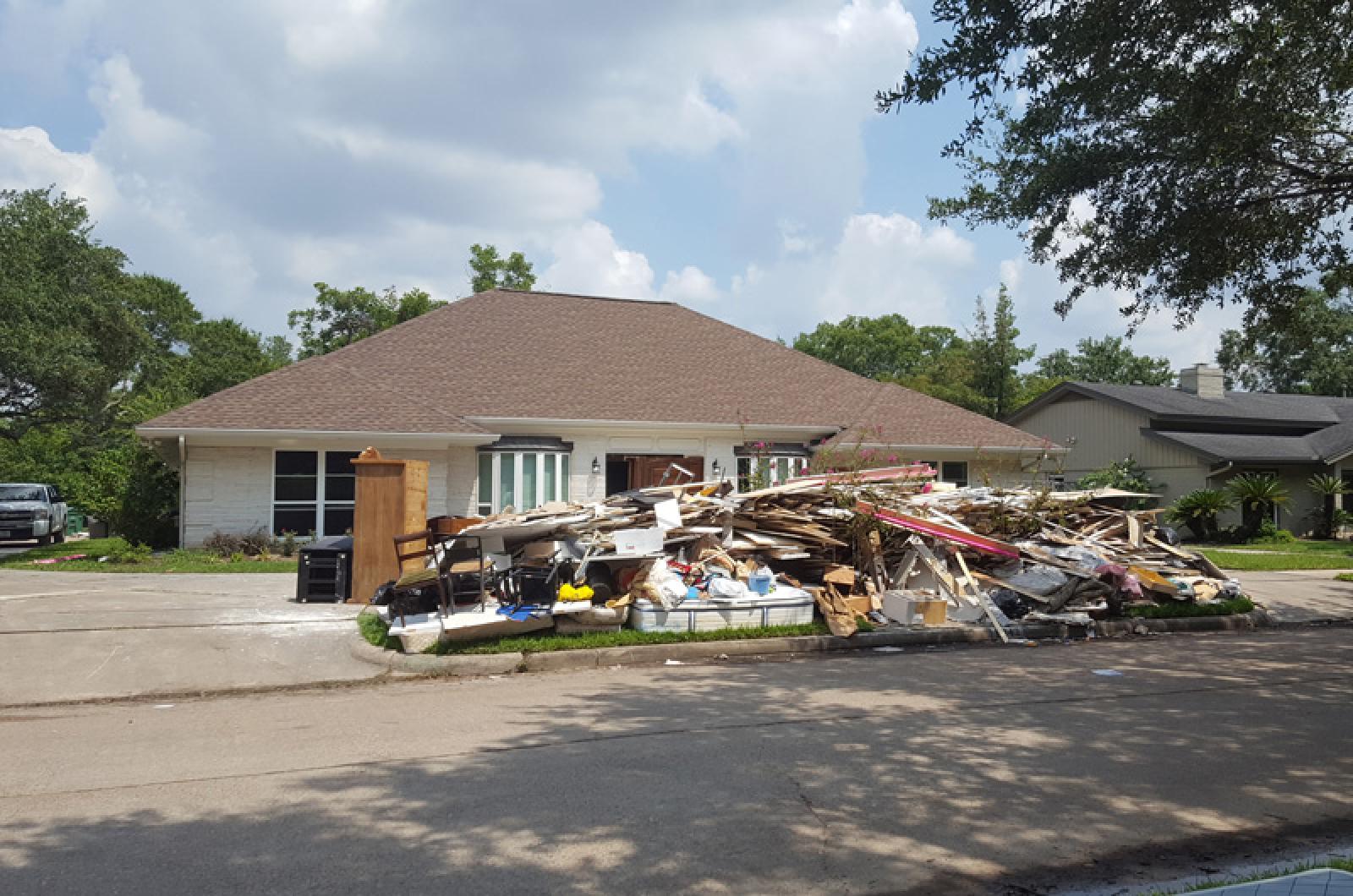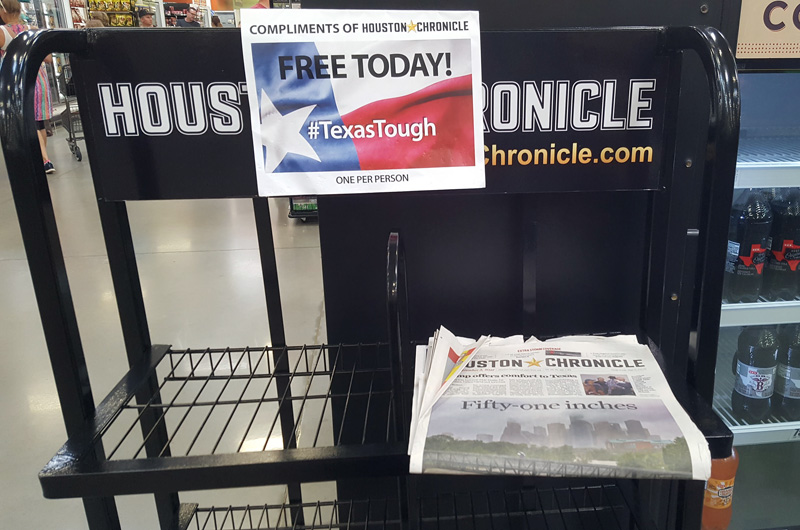I am a compulsive channel surfer, and had my car radio tuned to 95.7 when I stopped in a grocery store on the outskirts of Houston after a weekend in the city. The song playing when I returned to my car was I Can See Clearly Now.
Gone are the dark clouds that had me blind; it’s gonna be a bright (bright), bright, (bright) sun-shiney day.
I’d stopped to buy the Sunday paper. There was one copy of the Houston Chronicle left on the rack, with a six-column photo of one of the city’s three skylines and of Buffalo Bayou so swollen after days and days and days of rain from Hurricane Harvey it was nearly spilling over a pedestrian bridge. Fifty-one inches, the headline said.
They wouldn’t let me pay for the paper. By they, I mean the staff of the Houston Chronicle. That Sunday edition of the paper — the paper that serves the fourth-largest city in the country — was free. There was no price printed on the front, or even a bar code. There wasn’t a note to readers explaining this decision. It just was.
It didn’t surprise me. What a Houston thing to do, I thought. The hurricane was marked by acts of generosity and selflessness, of people going out into rising waters in their boats and pick-up trucks to rescue family, friends, strangers. After the storm, volunteers lined up by the hundreds outside the shelters. More than 1,000 volunteers a day had gone to the food bank since Harvey hit.
“They say neighbor helping neighbor,” I heard a man say at a coffee shop in Meyerland, Houston’s traditionally Jewish neighborhood. “No...it was this whole region.”
Synagogues had flooded, he was saying, and now the rabbis were working with some churches for places to go during High Holy Days.
I had driven into Houston on Friday afternoon, skipping around the dial the entire time, pausing for Shakira on a Spanish station and R.E.M. on a classic rock one. As I got closer to the city, I started hearing more than music.
“I have never been more proud to say I’m a Houstonian than this week,” said Kevin Quinn, the afternoon DJ on 104.1. “Harvey knocked us down, but it didn’t knock us out.”
By the time I reached Houston the floodwaters were receding and the airports had re-opened. Some roads were still flooded, creating strange traffic patterns. Stoplights at major intersections throughout the city were broken, paralyzed and blinking red. Everybody treated them as stop signs, three rows of cars at a time taking their turns across the multilane roads.
Houston is a driving city, larger than Los Angeles in area. Harris County is larger than New Jersey. There are more than six million people living in the area. I was one of them more than a decade ago, when I was a college student at Rice University. I hadn’t been back in years, and when I saw the three distinct skylines appear on the horizon, I felt a comforting pull in my chest.
I was driving to meet my college friend Niki, who was trying on dresses for her upcoming wedding. On the way to the shop I turned the radio dial again and landed on 95.7, the ESPN station. The hosts were talking about JJ Watt’s post-hurricane fundraising. The Houston Texans’ defensive end had just hit the $15 million mark in his effort. He started with a goal of $500,000.
I’ll never give JJ a hard time again, one host said. He was also looking forward to seeing the Astros come home to play baseball. That will do a lot for Houston, he said.
After the dress appointment, while heading north to meet another friend for dinner, I stumbled on 105.3, a South Asian station. The commercials were in both English and Hindi, the music straight out of Bollywood, and I had a solo dance party in my car.
The deejay’s name was Rashmi (“Don’t rush me,” she joked during her signoff), and she wished all the listeners a happy Eid, the Muslim holiday that had just ended. Rashmi, too, spoke of Harvey’s devastation and of what everyone would do to move forward. They would be Houston Strong, she said.
“We are trying to get back to normality,” she said. “This city has given us so much.”
Later I found 98.7, a Vietnamese station. In the 1970s, Houston resettled hundreds of thousands of Vietnamese refugees, and it continues to resettle more refugees than any other city in America.
In my sociology class freshman year, I learned that there was no majority racial or ethnic population in Harris County, that the Latino population was about the same size as the Anglo one. This hasn’t changed much in the ensuing years. If you want to see what America will look like in the coming decades, look at Houston.
I had never lived in such a place before, and I felt proud to be there in this city of the future, among the quinceañera shops in a city that celebrates Bun B Day, in the city where Beyoncé grew up. Houston felt like a giant, sprawling secret, since the rest of the country didn’t seem to pay much attention to it. I told people I missed it all the time, and they scoffed. HOUSton? they said. But I knew.
The Astros came home on Saturday, beating a pitcher named Matt Harvey (you can’t make this stuff up) in the first game of a doubleheader. I went to the first game with Niki and her mom, and we listened to the second game on the radio. Niki’s mom wondered if Miss Carol would call in. Miss Carol, she said, called in often just to talk, and to offer support to the ‘Stros. She came to the city after Hurricane Katrina struck Louisiana in 2005. Houston took in 200,000 evacuees, some of whom were in my classes at Rice for a semester. About 40,000 people stayed.
It doesn’t matter if you’re an evacuee from Louisiana or a refugee from Vietnam, if you’re an NFL defensive end or a college kid from New England, if you’re fifth-generation Hispanic Texan or first-generation Ethiopian. Houston takes everyone in and offers a home. It does this quietly and without pretension, a free newspaper on the grocery store rack.
It’s not necessarily a great place to visit, someone told me, but it’s a good place to live.
After the weekend was over, I flipped through the sections of my newspaper. On page G5 there was a story about the city’s “most enduring pop song,” a 45-year-old tune by a black Houstonian named Johnny Nash.
“I can see clearly now the rain has gone.”
Ivy Ashe is a former Gazette reporter and photographer. She is a journalism doctoral student at the University of Texas at Austin.





Comments (10)
Comments
Comment policy »